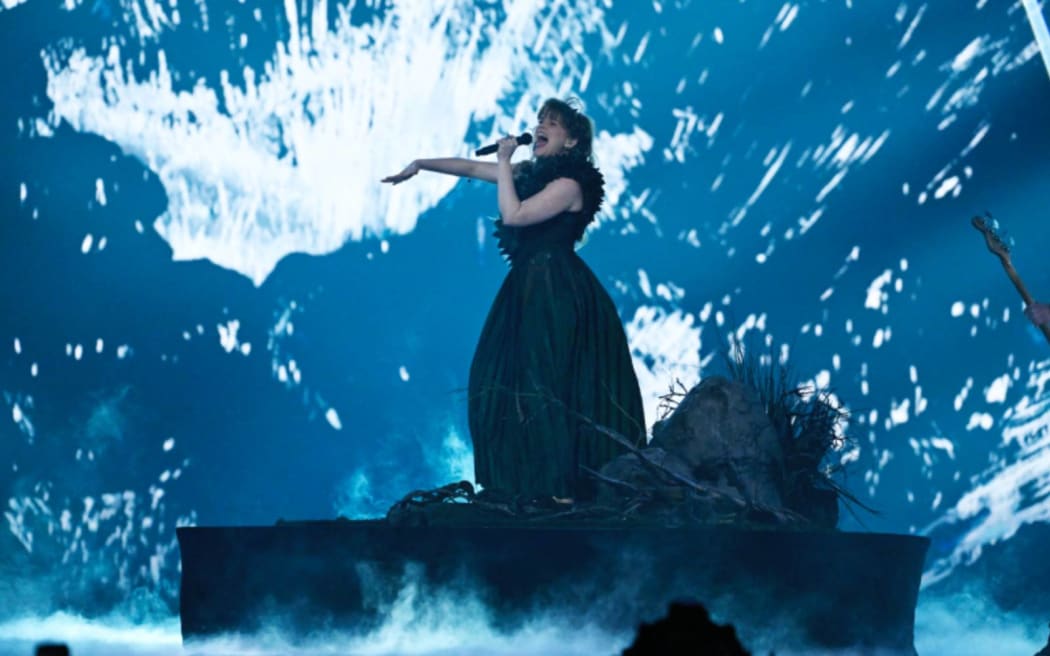
Riddle representing Norway with the song 'Ulveham' performs on stage during the second semi-final of the 68th edition of the Eurovision Song Contest. Photo: JESSICA GOW / AFP
By Jennifer Clarke for BBC News
The 68th Eurovision song contest is taking place in Malmo in Sweden.
On Thursday, Israel's Eden Golan is competing for a place in the grand final amidst controversy about her country's participation.
What is the Eurovision Song Contest and which countries take part?
The Eurovision Song Contest is an annual televised competition organised by the European Broadcasting Union (EBU).
The theme of the 2024 contest is "united by music", and it features 37 performers chosen to represent their country.
Songs must be original and no more than three minutes long. Lead vocals must be live, and a maximum of six singers and dancers are allowed.
Most Eurovision countries are European, but Australia takes part every year, after being invited to join Eurovision's 60th anniversary celebrations in 2015. However, Australia cannot host if it ever wins.
Other non-European countries including Israel participate because they are members of the EBU.
Why is the 2024 Eurovision Song Contest taking place in Sweden?
The 2024 contest is being held in Malmo, Sweden, after Loreen won in 2023 with her song 'Tattoo'.
She became the first woman to win the contest twice, after triumphing in 2012 with 'Euphoria'.
Loreen is one of only two individual singers to score more than one Eurovision victory - the other being Ireland's Johnny Logan.
This is the seventh time Sweden has staged the contest, and the third time it's been held in Malmo.
As 2024 is the 50th anniversary of Swedish group Abba's first Eurovision win with 'Waterloo', there had been speculation about the band's potential involvement. But Abba members told the BBC they would not perform.
When are the Eurovision semi-finals and final, and how can I watch and listen?
The grand final will be at the Malmo Arena on Saturday 11 May.
Sweden will be the first country to perform, after a random draw.
France, Germany, Italy, Spain and the UK are also guaranteed a place in the final, so do not compete in either semi-final, but they will have the opportunity to showcase their songs during the shows.
Fifteen countries competed in the first semi-final on Tuesday, with Ireland, Croatia and Ukraine among the 10 going through. Moldova, Iceland, Australia, Poland and Azerbaijan did not qualify.
Sixteen countries feature in the second semi-final on Thursday 9 May (Sweden time), including Austria, Denmark, Greece and Israel.
Who is the UK entrant Olly Alexander?
A seasoned performer, Alexander has scored several top 10 hits around Europe
Popstar Olly Alexander is representing the UK at the 2024 contest, with his song 'Dizzy'.
The former Years and Years frontman is hoping to improve on the UK's disappointing performance in 2023, when Mae Muller came second to last.
Alexander is well-known around Europe for hits including 'Desire', 'King' and 'If You're Over Me'.
He is also a Bafta-nominated actor, having played the lead role in Channel 4's hard-hitting Aids drama It's A Sin.

Eden Golan representing Israel with the song "Hurricane" during the second semi-final of the 68th edition of the Eurovision Song Contest (ESC) at the Malmö Arena, in Malmö, Sweden, Thursday, May 09, 2024. Photo: Jessica Gow / TT / Code 10070 (Photo by JESSICA GOW / TT NYHETSBYRÅN / TT News Agency via AFP) Photo: JESSICA GOW / TT News Agency via AFP
Why is Israel's Eurovision entry controversial?
Eden Golan's song Hurricane is a rewritten version of the country's original entry, 'October Rain', which was thought to reference the 7 October Hamas attacks on Israel.
The revised lyrics tell the story of a woman experiencing a personal crisis, according to Israel's public broadcaster, Kan.
But after the organisers barred the song for its political content, the country's president, Isaac Herzog, called for "necessary adjustments" to ensure Israel could compete.
Separately, musicians and organisations from a number of countries have called for Israel to be suspended over the war in Gaza.
Iceland's Association of Composers and Lyricists said Israel's military action made its participation incompatible with an event "characterised by joy and optimism".
Similar objections have been raised in Finland, Norway, Denmark and Sweden, with many pointing out that Russia has been disqualified since its invasion of Ukraine in 2022.
Eurovision organisers have resisted calls for Israel's exclusion, saying the situations in Ukraine and Gaza are different.
The EBU has also said that abuse and harassment of artists over Israel's participation is "unacceptable".
How does Eurovision voting work?
The semi-finals are decided entirely by a public vote from competing countries and people in the rest of the world.
Audiences in the UK, Germany, Sweden and the other countries which are not competing in either semi-final can vote.
For the final, every country which qualifies awards two sets of scores: one from a jury of experts and one by fans.
Each of their 10 favourite songs is given points - but they cannot vote for their own country's song.
Their favourite act receives 12 points, their second-favourite 10 points, their third choice eight points, and then seven points, and so on, down to one point for their 10th favourite.
Eurovision was one of the first televised competitions to let viewers vote.
Fans in Austria, Germany, Sweden, Switzerland and the UK began voting by phone in 1997. The rest of the world was allowed to vote in 2023, with points given to the 10 most popular songs worldwide.
How much does Eurovision cost?
Each participating broadcaster pays an entrance fee to the EBU.
France, Germany, Italy, Spain and UK pay the most, although the BBC does not make its contribution public.
It is thought staging the 2023 event in Liverpool cost the BBC between £8m and £17m. The UK government pledged £10m, while local authorities in Liverpool committed £4m.
- BBC News




